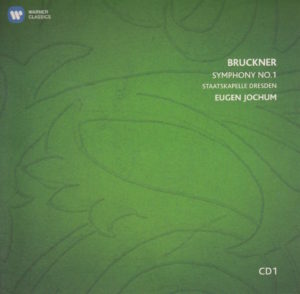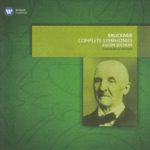 This morning’s conductor of Anton Bruckner’s Symphony No. 1 in C Minor (WAB 101) is, once again, German-born Eugen Jochum (1902-1987), unarguably one of the most highly respected interpreters of Anton Bruckner’s music who ever lived.
This morning’s conductor of Anton Bruckner’s Symphony No. 1 in C Minor (WAB 101) is, once again, German-born Eugen Jochum (1902-1987), unarguably one of the most highly respected interpreters of Anton Bruckner’s music who ever lived.
I have two CD box sets of Bruckner symphonies that were conducted by Jochum – this one, on the Warner Classics label, and the one to which I listened yesterday on the DG label. I chose to listen to them in chronological order. Yesterday’s recording was made in 1965, when Jochum was 63. The recording this morning was made in 1978, when Jochum was 76. In either case, Bruckner was 41 when he composed the Linz version of his Symphony No. 1 in C Minor, which is (again) the version Jochum chose.
 The orchestra for this morning’s symphony was Staatskapelle Dresden, one of the world’s oldest orchestras (founded in 1548 by Maurice, Elector of Saxony). Jeepers, creepers. That’s truly amazing.
The orchestra for this morning’s symphony was Staatskapelle Dresden, one of the world’s oldest orchestras (founded in 1548 by Maurice, Elector of Saxony). Jeepers, creepers. That’s truly amazing.
The booklet of liner notes in this box set is minimal, and not as interesting as the one in the box yesterday. However, there are a couple of good comments from the section of the essay titled “Eugen Jochum as Bruckner conductor,” written by Karl Ganzer:
Among the innumerable conductors who strove for a faithful interpretation of Bruckner’s symphonies, Eugen Jochum was…rightly considered the leader Bruckner exponent of his day, and his reading of the nine mature symphonies are characterised by a meticulous, balanced consideration of symphonic form. The spiritual foundations and metaphysical substance of Jochum’s approach were based on the affinity this Swabian conductor felt for the Austrian symphonist in whom he had believed so deeply from an early age.
The spirituality of Jochum’s music-making was most evident in his love for the German Romantic tradition, though he was also an energetic and successful champion of certain contemporary composers such as Paul Hindemith, Carol Orff and Werner Egk. For many people, however, Jochum remains their undisputed guide who introduced them to Bruckner’s musical universe.
One of the reasons why I love doing these musical explorations is because I learn a lot about tangential things, even myself. In this case, I learned something about Eugen Jochum I didn’t know before: He was a deeply spiritual man, who connected with Bruckner on a spiritual/mystical level.
That’s a wonderful basis for connecting to music, and it’s probably why Bruckner resonates so deeply with me, too.
First, the objective aspects of this morning’s project:
Bruckner wrote his symphonies in four parts. The breakdown of this one (1866 Linz version), from this particular conductor (Jochum) and this particular orchestra (Staatskapelle Dresden), is as follows:
Allegro…………..12:29
Adagio……………12:38
Scherzo……………9:02
Finale……………..12:57
By way of contrast, the breakdown of yesterday’s (also using the 1866 Linz version), from the same conductor (Jochum) but a different orchestra (Berliner Philharmoniker), was:
Allegro…………..12:38
Adagio……………12:35
Scherzo……………8:55
Finale……………..13:13
The tempi is virtually the same, with only a difference in running time of about :15 – today’s symphony a slight :15 quicker.
But, now comes the really interesting part:
My Rating:
Recording quality: 5
Overall musicianship: 5
CD liner notes: 3 (minimal information, one essay)
How does this make me feel: 5
Remember what I wrote yesterday? I wrote that even though everything about the Jochum DG recording was remarkable, even the CD booklet was first-rate…and yet it wasn’t touching my soul, for some reason. I wasn’t blown away by it.
This morning’s recording is different. Nearly night and day.
I don’t know what it is about today’s performance of Symphony No. 1 by Jochum.
The variables:
1. Age of recording (1965 yesterday, 1978 today)
2. Orchestra: Berliner Philharmoniker yesterday, Staatskapelle Dresden today)
3. Jochum’s age (63 in yesterday’s recording, 76 today)
The constants:
1. Bruckner’s Symphony No. 1 in C Minor, Linz version
2. Jochum conducting (is 13 years age difference between then and now really that big of a deal?)
3. Relatively the same tempi (only brisker in pace by :15 today)
Yet, today’s recording feels different. It’s brasher, bolder, more powerful. It’s highs seem higher. It’s lows seem lower. The standard by which I judge the “feel” of a Symphony – the last :60 or so of Adagio, Movement II – is back in full force. The magic and wonder are there.
But it’s not just the ending to Adagio. It’s the entire symphony. It strikes me in a different way.
Even the intro to Scherzo (Movement III) seems more powerful, energetic.
And the Finale is absolutely gripping.
Why? How? What’s the difference? Is one of the variables me? Should I have listed the variables and constasnts like this, adding a fourth for both:
The variables:
1. Age of recording (1965 yesterday, 1978 today)
2. Orchestra: Berliner Philharmoniker yesterday, Staatskapelle Dresden today)
3. Jochum’s age (63 in yesterday’s recording, 76 today)
4. Me (my frame of mind, time of day, location, etc.)
The constants:
1. Bruckner’s Symphony No. 1 in C Minor, Linz version
2. Jochum conducting (is 13 years age difference between then and now really that big of a deal?)
3. Relatively the same tempi (only brisker in pace by :15 today)
4. Me (I’m the same person, give or take)
Is music really that subjective where it will affect me differently given the time and day?
I doubt that. To my ears, something about this recording seems more expansive, especially in the brass instruments.
Whatever the cause of the difference, I prefer today’s Jochum interpretation to yesterday’s.
Go figure.
